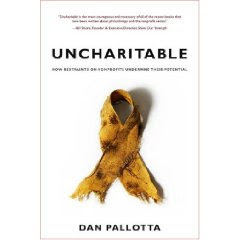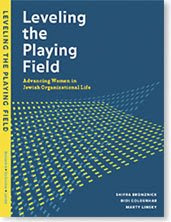Hildy Gottlieb's new book, The Pollyanna Principles, draws from her experience as an educator and consultant to address a real challenge for charities and other organizations working in the community—regardless of the quality of work, most efforts don’t realize significant improvement in a community’s quality of life. Check out the first part of a two-part interview we had with her.
Read MoreBook Review: CauseWired

This has been a busy month reviewing books but luckily both of them were fabulous. I just finished reading CausedWired by Tom Watson, the publisher of onPhilanthropy.com. Tom writes about how individuals and institutions are changing the face of philanthropy using new media tools. We are living through an exciting time where you don't have to be a socialite or a fortune 500 CEO to be a philanthropist. You can be a high school student with a facebook account or a young professional that connects using Twitter. The book is a great study on how Gen X and Y are being philanthropic and how nonprofits are changing how they interact with the public to be more accessible using these tools. This is one of the few books that I read that immediately caused me to do something I said I would never do. After reading the first two chapters I opened a Facebook account and connected with Headwaters donors and volunteers. I had been avoiding Facebook because I had been using LinkedIn (connect with me here) for social networking and I felt like it would be too much to have two social networks to keep up. CauseWired made me rethink that position. Multiple access points helps individuals get to know your cause and while we aren't using those tools as a fundraising method right now, being accessible better connects you to supporters and makes your work more transparent. I also started to Twitter (which I also said I would never do). CauseWired is a great study in how these web 2.0 tools are being used, who is using them effectively, and what the true potential is of these mediums.
CauseWired is available now at Amazon.com, this book is a must read if you are developing strategies for reaching new donors and supporters using web tools.
If you have examples of nonprofits that are using these tools effectively or ideas about what you would like to see me Twitter or include on my Facebook page, add your suggestions in the comments.
Book Review: Uncharitable

Dan Pallotta send me a copy of his new book Uncharitable to review and I LOVED IT! I am a big believer in the potential of the nonprofit sector and I also believe that there are many structural issues that impact how effective nonprofits can be at achieving their missions. Dan's premise is that human beings are innately charitable and that we have a desire to help our fellow man. Our current system of charity is the bureaucracy that we set up to fulfill that need to help one another. This system has remained unexamined because doing "good" is good enough. In this book Dan asks some key questions: Does this system work? Is it the best system we could have? What other systems are available? His vision is to set free charities and all of the people that work for them from a set of rules that were designed for another age and another purpose and begin to use the rules of free-market capitalism to supercharge the sector. Before you get all high and mighty and remind me that the free-market system is collapsing around us everyday and that opening up the nonprofit system to its corruption and volatility wold ruin the purity of the sector, I'd like to remind you that the sector is already influenced by the corruption of the for profit sector, as evidenced by many high profile scandals and the volatility for the free-market is what is shrinking my foundation's endowment. The nonprofit system has all of the pitfalls of a free-market system with none of the benefits (e.g tolerance for risk, investment in research and development, and competitive pay). This book is destined to start some great conversations, which are very overdue.
The book is available November 28th at Amazon, check it out here.
Book Review: The 11 Questions Every Donor Asks
Occasionally I will get a new philanthropy book or report from a publisher to review. The most recent was The 11 Questions Every Donor Asks and the Answers all Donors Crave by Harvey McKinnon. The book covers questions like:
*Why me?
*How much do you want?
*Will my gift make a difference?
*How will I be treated?
*How will you measure results?
For those of you that fundraise professionally or as a volunteer know intuitively that you should know the answers to these questions but knowing you should know something and actually preparing to answer the questions is a completely different thing. From the standpoint of being “professional donor” these are the same questions that I want answers to during site visits.
*Why me? Does our foundation provide an added benefit of name recognition or leverage if we fund this project?
*How much do you want? Is the ask size appropriate and match our foundation’s giving capacity?
*Will my gift make a difference? Will you do this project with or without our foundation’s funding? How would our gift increase your nonprofit’s ability to do good work in the community?
*How will I be treated? I pride myself on not being the program officer that tries to leverage their power to get all star treatment but it is important to treat individual donors and foundation representative with courtesy.
*How will you measure results? Will this program positively impact the community and how will you measure that impact?
11 Questions Every Donor Asks is a back to basics fundraising approach but sometimes the most simple techniques are the most effective.
Book Review: Leveling the Playing Field

Occasionally I will get a new philanthropy book or report from a publisher to review. Before the craziness of the Council on Foundations conference I received "Leveling the Playing Field: Advancing Women in Jewish Organizational Life" by Shifra Bronznick, Didi Goldenhar, and Marty Linsky. This is a "how-to" book for those that want to champion gender equity in the workplace. The book covers why equitable environments are key to organizational success and long-term health of the Jewish community. This argument is much like the continued call for diversity in the foundation field to strengthen not just organizations but the communities that foundations are committed to enriching.
The authors have an interesting point that if you are committed to increasing equity in organizations the you must expand your own advancement opportunities because your "ability to support gender equity depends on where you sit in the organization." One way to do this is ask for what you want and need within your organization. Don't expect your talents to be noticed and recognized. "Women professionals benefit when they state their aspirations clearly and enlist their colleagues and supervisors in helping them meet their goals." If you want to be promoted to vice president in your organization within five years, tell your organizational leadership that that's what you aspire to. Being honest about your goals decreases the chance that you will be mistakenly overlooked when that position comes open. It will also give you time to prove your skills in the context of that aspirational position. People will start to look at you as a possible candidate, so make sure you are acting like a candidate. More on branding yourself for future positions can be found in my professional development guide on branding yourself for success.
I liked that this book had practical tools that are useful for any type of organization that is working to increase diverse perspectives. The authors have also developed a great conversation kit that helps you facilitate your own discussion about equity. The toolkit and book are available at www.advancingwomen.org
